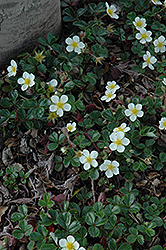It's all about ...
plants

Height: 10 inches
Spread: 12 inches
Sunlight:
![]()
![]()
Hardiness Zone: 2a
Other Names: Woodland Strawberry, Wild Strawberry
Description:
A compact variety with interesting toothed green foliage, presenting white blooms and fruit all season long; fruits may be white or red, depending on variety; re-seeds easily; berries are sweet and flavorful
Edible Qualities
Alpine Strawberry is a perennial that is commonly grown for its edible qualities. It produces small red round berries which are usually ready for picking from late spring to early fall. This variety is considered an everbearing type of strawberry, which means that it will repeatedly produce fruit across most of the season. The berries have a sweet taste.
The berries are most often used in the following ways:
- Fresh Eating
Features & Attributes
Alpine Strawberry features dainty white daisy flowers with lemon yellow eyes along the stems from late spring to early summer. Its serrated oval compound leaves remain green in colour throughout the season. It features an abundance of magnificent red berries from early to late summer.
This is an open herbaceous perennial with a spreading, ground-hugging habit of growth. Its medium texture blends into the garden, but can always be balanced by a couple of finer or coarser plants for an effective composition. This plant will require occasional maintenance and upkeep, and should not require much pruning, except when necessary, such as to remove dieback. It is a good choice for attracting birds to your yard, but is not particularly attractive to deer who tend to leave it alone in favor of tastier treats. It has no significant negative characteristics.
Aside from its primary use as an edible, Alpine Strawberry is sutiable for the following landscape applications;
- Border Edging
- General Garden Use
- Groundcover
- Container Planting
Planting & Growing
Alpine Strawberry will grow to be about 10 inches tall at maturity, with a spread of 12 inches. It grows at a fast rate, and under ideal conditions can be expected to live for approximately 10 years. As an herbaceous perennial, this plant will usually die back to the crown each winter, and will regrow from the base each spring. Be careful not to disturb the crown in late winter when it may not be readily seen! This is a self-pollinating variety, so it doesn't require a second plant nearby to set fruit.
This plant is typically grown in a designated edibles garden. It does best in full sun to partial shade. It does best in average to evenly moist conditions, but will not tolerate standing water. It is particular about its soil conditions, with a strong preference for rich, acidic soils. It is somewhat tolerant of urban pollution. Consider applying a thick mulch around the root zone in both summer and winter to conserve soil moisture and protect it in exposed locations or colder microclimates. This species is not originally from North America.
Alpine Strawberry is a good choice for the edible garden, but it is also well-suited for use in outdoor pots and containers. Because of its spreading habit of growth, it is ideally suited for use as a 'spiller' in the 'spiller-thriller-filler' container combination; plant it near the edges where it can spill gracefully over the pot. Note that when growing plants in outdoor containers and baskets, they may require more frequent waterings than they would in the yard or garden. Be aware that in our climate, most plants cannot be expected to survive the winter if left in containers outdoors, and this plant is no exception. Contact our experts for more information on how to protect it over the winter months.
